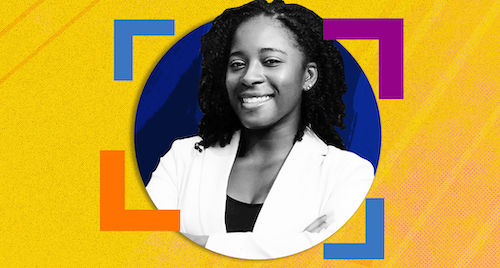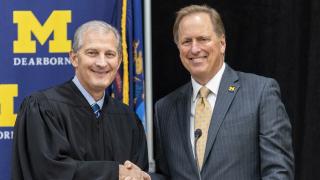
College of Business graduate Cachet Colvard has experienced — and learned from — four major health crises.
She quarantined on a student exchange trip to China during H1N1. While doing health-based research in Ghana, Ebola broke out. Volunteering at a women's health clinic in Nicaragua, cases of Zika appeared. And while working at Cleveland Clinic Abu Dhabi this year, Colvard helped manage the transition of care from in-person to virtual due to the COVID-19 pandemic.
"My international travels started at 16 when I went to Shanghai as an exchange student. Oddly enough, many of them have aligned with epidemics or pandemics," says Colvard, who wanted to work in healthcare since she was a high school student. "And it's helped me better mentally prepare for what we are experiencing today."
These experiences influenced Colvard, now a Department Administrator at Cleveland Clinic Abu Dhabi, to continue seeking opportunities that diversified the lenses she used to understand world problems.
Finishing up her MBA this month, the College of Business Fall 2020 graduate says she knows the importance of business understanding in a complex organization like a healthcare system. Prior to her roles at Cleveland Clinic, she worked as a Data Analyst at the Detroit Medical Center — and wanted to learn more from business experts.
Colvard says she pursued her degree from UM-Dearborn because she knew the quality of Michigan professors. She earned her undergraduate degree from U-M in 2015 and her Master of Health Services Administration from U-M in 2017. While in Abu Dhabi, she continued her UM-Dearborn MBA classes. Taking graduate courses while overseeing healthcare during an unprecedented critical time was beneficial, she says.
"I learned valuable lessons in my MBA courses while the COVID-19 pandemic was unfolding."
For example, she says a business strategy class shared how to manage industry and technological change when she had to work on managing that change herself. With the first wave of the pandemic in the spring, Colvard says that the United Arab Emirates closed its borders and implemented a curfew to slow the virus's spread. That made it difficult or sometimes physically impossible for patients to get to appointments if they resided outside of Abu Dhabi.
Colvard, who primarily supports the ophthalmology department, says they needed a way to still connect patients to doctors.
Virtual appointments were the answer. But many questions still needed to be answered. When someone has vision issues, how do you conduct a virtual appointment on their eye? How can it be proven to doctors and patients that it's an effective and valuable care experience? — and Colvard says she relied on business principles to provide solutions.
Her team looked at available and innovative diagnostic technologies, like cameras that can help doctors examine an eye's anatomy through a computer screen. She managed the department's time and resources appropriately and created virtual appointment time blocks for physicians. Chart reviews were done to ensure the quality of care. Looking at volumes and targets, she asked questions such as: How often did patients use the virtual services and, for the ones who did, how many required a follow-up appointment?
"Business strategies were extremely valuable in this process and helped me navigate this new world we were in. When things started to open back up, we also used analytics to decide when and how to revamp our 'normal' operations," she says. "That's not to say virtual services are going away — they are not by any means. Digital services can provide more timely services and are valuable for patients who don't have a critical need."
Colvard, who is passionate about health inequity and social justice issues, says these new virtual offerings are beneficial for people with mobility issues. For example, Colvard says some people drive from hours away to the hospital for their care. Now, with virtual services, patients with less critical needs have the option to see their ophthalmologist from their home.
Cleveland Clinic Abu Dhabi provides much diversity of education and experiences, especially given the Abu Dhabi population is roughly 80 percent expatriate. Colvard says she hears four or five different languages a day. Given this, she's learned new ways and techniques to connect with people and patients, even when the language itself is a barrier. This diversity is something she will continue to seek out both personally and professionally. Earning this diploma is another step along her journey to help others.
"It's nice to be here at this finish line. But, with the necessary action needed in the world, there's always another start line. This degree offers another lens for me to look through when trying to understand and resolve complex problems," she says. "I don't know exactly where I want to end up when it comes to career or location. But I can tell you that whenever I am, I want to make sure that I'm using my education, experiences, and opportunities to make a difference in our world."




